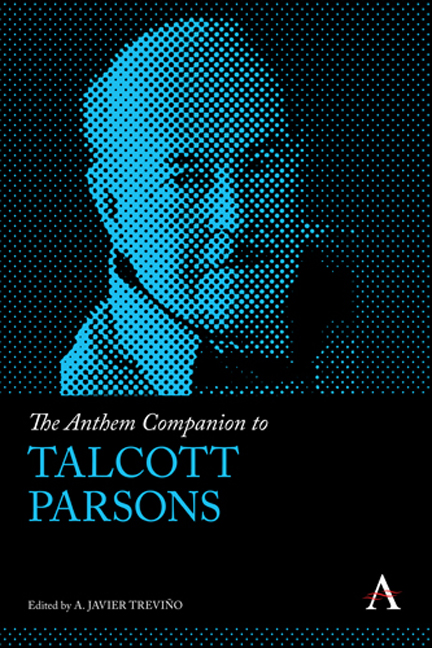Book contents
- Frontmatter
- Content
- Introduction
- Part I Political and Humanist Concerns
- Part II Social Evolution and the American Societal Community
- Chapter Seven Explaining Modernity: Talcott Parsons's Evolutionary Theory and Individualism
- Chapter Eight Talcott Parsons's Historical Analysis and the Cultural–Political Freeze in China: A Reinterpretation
- Chapter Nine Talcott Parsons and American Exceptionalism
- Chapter Ten American Society and the Societal Community: Talcott Parsons, Citizenship and Diversity
- Chapter Eleven Parsons and Nisbet: Two Versions of Sociological Communitarianism
- Contributors
- Index
Chapter Eleven - Parsons and Nisbet: Two Versions of Sociological Communitarianism
from Part II - Social Evolution and the American Societal Community
Published online by Cambridge University Press: 22 July 2017
- Frontmatter
- Content
- Introduction
- Part I Political and Humanist Concerns
- Part II Social Evolution and the American Societal Community
- Chapter Seven Explaining Modernity: Talcott Parsons's Evolutionary Theory and Individualism
- Chapter Eight Talcott Parsons's Historical Analysis and the Cultural–Political Freeze in China: A Reinterpretation
- Chapter Nine Talcott Parsons and American Exceptionalism
- Chapter Ten American Society and the Societal Community: Talcott Parsons, Citizenship and Diversity
- Chapter Eleven Parsons and Nisbet: Two Versions of Sociological Communitarianism
- Contributors
- Index
Summary
The long-awaited, posthumous publication of American Society: Toward a Theory of Societal Community promises a new stage in Parsonian scholarship, for it represents the author's last attempt at a synthesis of his empirical and theoretical works over four decades. Existing literature on the magnum opus is still preliminary, focusing largely on its thematic relevance to social inclusion, civil society and multiculturalism. These discussions share an abiding concern with the potential of modern society to furnish a viable institutional and moral framework in which individual and sociocultural differences can be at once contained and enhanced. An adequate treatment of these and other contemporary issues, however, presupposes a conceptual exposition of Parsons's understanding of community per se. Instead of following the nostalgic call for a return to tradition, Parsons maintains that the quest for community need not compromise our commitment to modern values such as individual autonomy and social justice. Indeed, the very notion of societal community reveals Parsons's overarching purpose to go beyond the longstanding dichotomy of community and society, or in Tonnies's terms Gemeinschaft and Gesellschaft. In this regard, the crystallization of societal community in the context of American modernity can be taken as Parsons's final, definitive answer to Durkheim's question: “How does it come about that the individual, whilst becoming more autonomous, depends ever more closely upon society?” A sustained reflection on this question appears all the more necessary in light of the pervasive sense of “crisis of the social” in our age of relentless globalization and individualization.
This consideration opens up the possibility of interpreting Parsons's last work from the perspective of sociological communitarianism. Closely related to its counterpart in moral and political philosophy, sociological communitarianism is a mode of analytic and normative inquiry that attempts to pinpoint the social conditions necessary for the mutual enhancement of individual liberty and social solidarity. Sharing a broadly Durkheimian approach on morality and society, sociological communitarians like Amitai Etzioni, Robert N. Bellah and Philip Selznick seek to articulate a social theory cum public philosophy that can suggest remedies to the anomic side effects of individualism.
- Type
- Chapter
- Information
- The Anthem Companion to Talcott Parsons , pp. 207 - 222Publisher: Anthem PressPrint publication year: 2016

